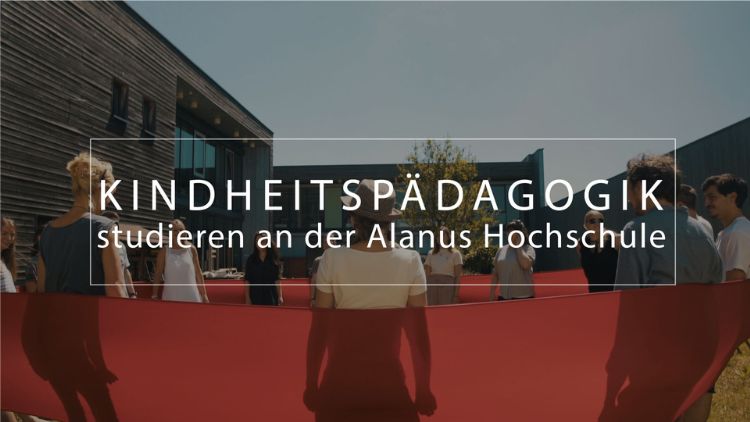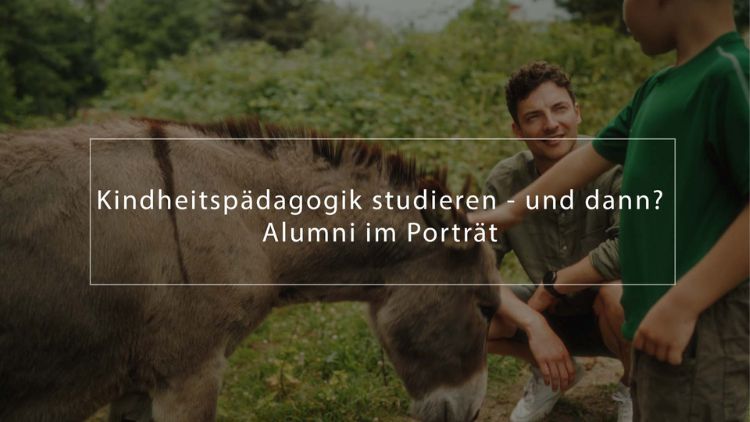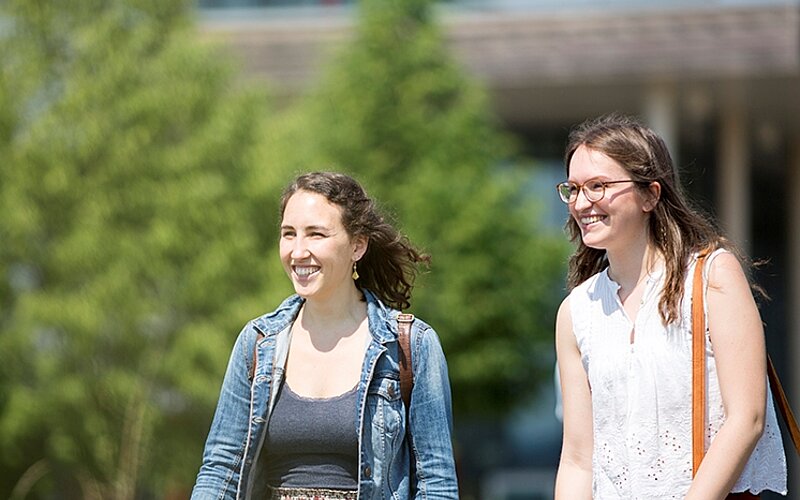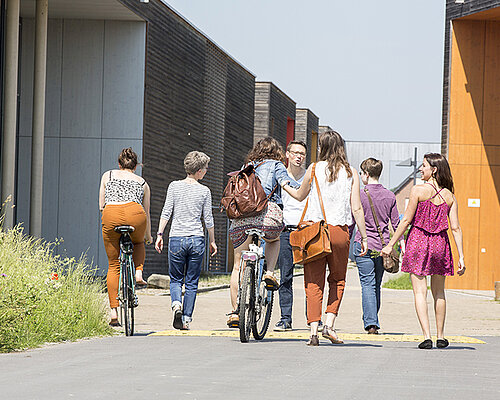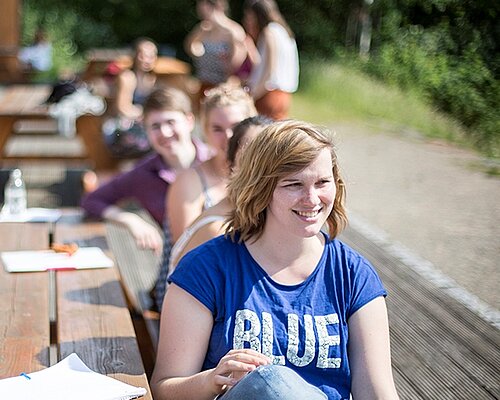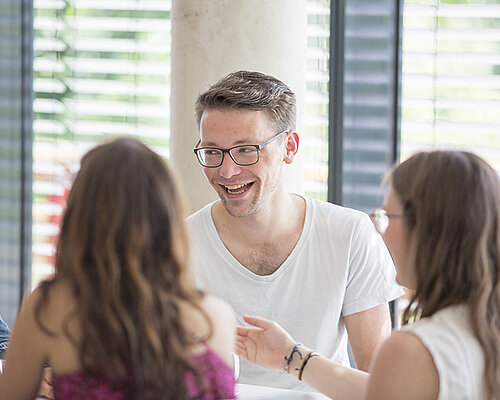Early Childhood Pedagogy
Bachelor of Arts / Full-Time & Part-Time
Are you interested in questions of early childhood, the world in which children and families live, and their integration into social structures? Would you like to explore these issues from the perspective of educational science, Waldorf education and other progressive pedagogical concepts, as well as psychology, sociology, philosophy and anthropology? Do you enjoy self-development, learning in a familiar atmosphere and broadening your own perspectives?
Then study early childhood education at Alanus University.
The Bachelor's programme focuses on elementary and early childhood education in theory and practice. It qualifies students for pedagogical careers in the care and education of children up to age 6, with and without special learning needs.
The programme is offered as a full-time and a part-time course. The latter is aimed at people with training as a state-certified early childhood educator or an equivalent qualification.
Special Features
Waldorf Education
Unique in Germany, this course focuses on the approach of early childhood Waldorf education in dialogue with general educational theory and concepts from the area of progressive education.
Art and Aesthetics
A wide range of seminars in music, drama and fine arts, offers students the opportunity to gain personal artistic experience and enables them to develop concepts and courses to promote the aesthetic development of children.
Studium Generale
Seminars and lectures on philosophy and social sciences encourage students to exam the relevant issues of our time in a broader context.
Career Development
Throughout the entire course of study, we support students in their personal development and in reflecting on their own (future) professional role in transferring theory to real-world practice, as well as in relating this process to their own professional biography.
Course Atmosphere
Small group learning, intensive support and guidance, and a modern campus in a scenic location with direct access to two major cities create the ideal conditions for successful studies.
Course Contents
The course is divided into five study areas that combine theory with practical experience.
The programme totals 180 credit points
- Studium Generale (18 credits full-time / 10 credits part-time)
- Fundamentals of Science (38 credits full-time & part-time) education, psychology, sociology, anthropology, law and business administration
- Profile Development (43 credits full-time / 51 credits part-time) Waldorf education, art and aesthetics, diagnosis, research, consulting, inclusion, transition, professionalisation
- Selected fields of education (20 credits full-time & part-time) play and sociability, movement and health, language and interculturality, nature and environment
- Early Childhood Pedagogy in Practice (50 credits full-time & part-time) applying the principles of early childhood education through practical experience
- Bachelor’s Thesis (11 credits full-time & part-time)
The module handbook is available under Downloads.
The crediting of previous training courses to the degree programme is possible individually or within the scope of existing cooperation agreements.
Organisation
The programme in early childhood pedagogy is offered as a full-time or a part-time course:
Full-Time Course
In addition to the ongoing lectures, seminars and exercises during the semester, the course is characterised by an extensive amount of practical experience. These phases are divided into an introductory internship and three intensive 7-week internships on the topics of observation and documentation, didactics and methodology, and practical research.
Part-Time Course
In order to facilitate in-service study, the part-time course is divided into self-study phases and intensive attendance phases, which are easy to plan and manage. These include 3 intensive weeks of attendance (Friday evening - Friday) and 10 weekend seminars (Friday evening – Saturday) per year. You are welcome to ask for the attendance phase schedule at the secretary's office.
Admission Requirements
Admission requirements for the Bachelor's programme in early childhood education include:
Full-Time Course
- General or subject-specific university entrance qualification (Abitur) or
- Advanced technical college entrance qualification (with successful completion of the university entrance exam) or
- Completed vocational training and at least 3 years of career experience in a related field (if applicable with successfully completed university entrance exam)
Part-Time Course
In addition to the requirements listed above:
- Completion of teacher training at a state-approved vocational school or college, or
- An equivalent level of education
Foreign applicants require proof of sufficient German language skills, both written and spoken. Please find out your level through a language placement test.
Career Prospects
Successful completion of the programme results in the academic title Bachelor of Arts (B.A.) as well as state-recognised certification as an early childhood educator in accordance with the Social Occupations Recognition Act NRW.
The programme qualifies and prepares students for the following fields of work, among others:
Early Childhood Education and Care
- In early intervention centres
- In kindergartens (Kita)
- In childcare at open all-day schools (OGS)
- In family advice centres and institutes
- In child and youth welfare services
Management (after several years of career experience)
- Of kindergartens
- Of childcare at open all-day schools
- Of family advice centres
- In child and youth welfare services
Education, Counselling and Research
- Positions in counselling centres and in advisory services
- Instructor in family and adult education
- Academic research at higher education institutes
The professional profile of early childhood educator was formulated by the "Studiengangstag Pädagogik der Kindheit" (Day of Study in Early Childhood Education), an umbrella association of early childhood education courses in Germany.
Master’s Programmes in Education
Alanus University of Applied Sciences offers several advanced degree courses for those who would like to continue their education. These include Master's degree programmes in education with the following focuses:
- Educational Research (if you are interested in working in childhood research)
- Waldorf Education/Schools and Teaching (if you are interested in working as a subject-specialised teacher at a technical school, vocational college or Waldorf Teacher Training seminar)
- Curative Education (if you are interested in development, research and management in curative education and social therapy)
Application Process
International degree-seeking students are asked to contact the General Student Advisory Service for the admission procedure. Please contact the person at this office who is responsible for the degree programme you are interested in.
Before submitting your application, you have the opportunity to obtain detailed, individual guidance from a representative of the Department of Education. Please make an appointment to schedule an appointment for guidance counselling or an admission interview.
Selection is based on a review of the application documents submitted and on a personal admission interview.
Videos
